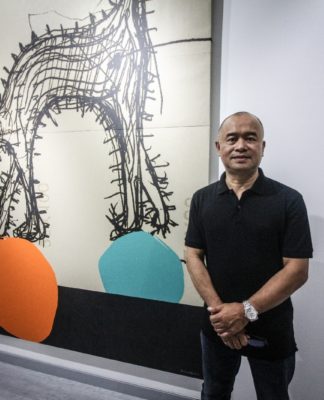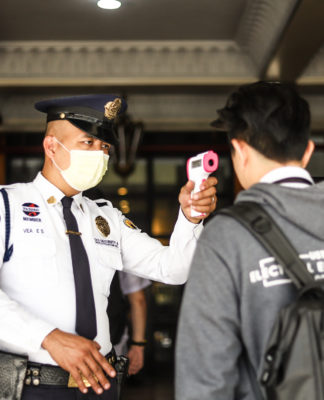ENVIRONMENTAL, architecture, and heritage conservation experts are defending UST after President Benigno Aquino III implied in his final State of the Nation Address (Sona) that the University was to blame for flooding in Manila.
The proposed flood “catchment area,” which the President claimed was opposed by a “big university,” would place UST’s heritage buildings in danger, and there was also no guarantee that it would work, experts told the Varsitarian.
“For the President to even put in his speech a snide remark about UST not cooperating, and for [his spokesman] to call the [UST] Open Field a ‘prized soccer field’ just shows they are insensitive to cultural heritage, and they don’t value things,” said Richard Bautista, architect of the National Committee on Monuments and Sites of the National Commission for Culture and the Arts (NCCA).
Bautista said there were plenty of solutions, including dredging rivers, esteros, and Manila Bay. “And in using UST Open Field, what is their plan to discharge water there? The fact that Pasig River overflows, touching UST will be a waste of money and heritage,” he said.
Ivan Henares, president of the Heritage Conservation Society of the Philippines, said the Department of Public Works and Highways (DPWH) and Malacañang speechwriters forgot that the government itself had declared the University a heritage zone.
“They placed President Aquino in a position of criticism. It is the duty of the Philippine Government to preserve and protect National Cultural Treasures,” Henares told the Varsitarian.
The DPWH proposed to dig out a “retarding” or “detention” tank for flood water under the UST Open Field in October 2011, a month after the 21-hectare University campus was declared a National Historical Landmark by the National Historical Commission of the Philippines in time for the UST Quadricentennial celebrations.
In January 2010, the UST Grandstand and open spaces, the Main Building, the Central Seminary, and the Arch of the Centuries were declared “National Cultural Treasures” by the National Museum.
‘Prized soccer field’
Aquino did not mention UST by name, but presidential spokesman Edwin Lacierda and DPWH Secretary Rogelio Singson later confirmed that the President was referring to UST in his speech at the Batasang Pambansa last July 27.
“Para matugunan ang madalas na pagbaha sa Maynila, isinulong natin ang pagpapagawa ng catchment area; pero tumutol po dito ang isang malaking unibersidad. May lumang mga gusali daw kasi silang baka maapektuhan ng gagawing proyekto,” the President said in his sixth and final Sona.
Lacierda questioned UST’s priorities in a television interview last July 28, asking: “Would you forgo safety over a prized soccer field?”
“Is that being unreasonable if we dig it (open grounds) up and make sure that the millions within that area would be safe from inundation, would be safe from danger and would put them (residents) out of a danger zone in times of storms and floods?” Lacierda said on ABS-CBN News Channel’s “Beyond Politics.”
On dzIQ990 Radyo Inquirer last July 29, Singson said that because UST had rejected the proposed water catchment area, Thomasians would have to bear with flooding. He added that roads around UST had been raised. “Ngayon magtya-tyaga ang mga taga UST dahil tumaas ang kalye diyan,” he said.
Thomasians led the public backlash against Aquino and his aides on social media, saying they had long been sacrificing because of the perennial flooding.
The militant group STAND UST said Aquino let out “yet another immature and arrogant innuendo,” and suggested that clearing Manila’s natural waterways be prioritized over digging out a huge tank under the UST Open Field.
‘Flooding worsened in UST’
Environmental planner Felicisimo Tejuco Jr., a professor at the College of Architecture, pointed out that the road elevation projects cited by Singson had worsened flooding inside the University.
“There seems to be no noticeable change in the average flood levels in and outside the campus. However, floodwater seems to creep into UST faster and subside slower,” Tejuco said.
Tejuco said the catchment area proposal was at best a partial solution, as it would only be effective in dealing with flash floods and not a “deluge like Ondoy,” the storm that brought a century’s worth of rainfall in 2009.
He asked: “Where are the studies that the catchment proposal will be successful? Where are the simulation studies that will prove na hindi magbabaha? This could have been presented to us, to prove the catchment’s efficiency and convince the school.”
Citing Malaysia’s Smart Tunnel, which functions as a road and storm drain, Tejuco said the tank could instead be built under the two-kilometer España Boulevard that passes in front of UST.
Against the law
Henares said “[all] engineers of the DPWH should be required to undergo heritage and cultural sensitivity training conducted by the [NCCA] or National Museum to avoid incidents like these from happening in the future.”
The National Cultural Heritage Act of 2009 defines National Cultural Treasures as “unique cultural property found locally, possessing outstanding historical, cultural, artistic and/or scientific value which is highly significant and important to the country and nation, and officially declared as such by pertinent cultural agency.”
Under this law, National Cultural Treasures are “immovable” and “shall not be relocated, rebuilt, defaced or otherwise changed in a manner, which would destroy the property’s dignity and authenticity, except to save such property from destruction due to natural causes.”
The campus is a witness to historic events. For instance, it served as an internment camp for foreign prisoners of war during World War II. The Open Field hosted youth rallies during all four papal visits to the country: Pope Paul VI in 1970, Pope St. John Paul II in 1981 and 1995, and Pope Francis last January.
Eric Zerrudo, director of the UST Graduate School Center for Conservation of Cultural Property and Environment in the Tropics, said the Open Field and other National Cultural Treasures of the University serve as a “memory and identity of the nation.” Clarence I. Hormachuelos














